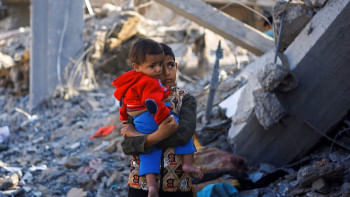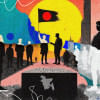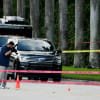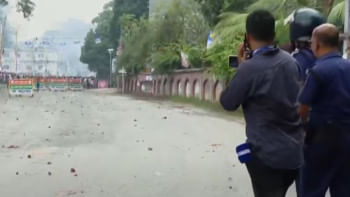A prelude to tomorrow

Late, late yestreen, I saw the new Moon,
With the old Moon in her arms;
And I fear, I fear, my Master dear!
We shall have a deadly storm.
—Ballad of Sir Patrick Spence
The new year is always full of new promises, like the new moon. But as this old ballad suggests, the new cannot ignore the shadow of the old. The juxtaposition of the two, especially when some old issues remain unresolved and are kept in the fold, can result in a storm. The singer, who is an avid reader of nature, reads the signs of nature to warn his master. Poets, writers and artists use their insights to delve into facts that are often in common sight but willingly or unwillingly overlooked. They make connections between dots.
Our new year started with news of some pre-election violence. At a time when hartals and blockades, the main political weapons of the opposition parties, were becoming comedic and farcical, we had the return of arson. Buses, cars, and trains were set on fire to remind us of the tragedies of 2015. There was a large-scale fear of the return of violence as we headed towards the election and the exercise of power. Awami League, in its manifesto, stated a clear message of boosting employment against the backdrop of its visible development. The cabinet with a new look has just been sworn in to deliver a smart Bangladesh. I think the smart thing to do is to create a system in which we do not have to rely on everyday items and basic facilities from others. We do not need a system that allows the price of onions or rice to soar the moment the supply chain is disturbed. We do not want a system that allows billions of hard-earned currencies to be stolen or sent abroad. We do not want to see a system that forces people to go to neighbouring countries for quality education or health services. With so much international focus on our governance, it is important that we create a smart country that puts our citizens first. We listen to them and remain champions of their desires and voices. We remain sympathetic to their worries and woes.
On Friday morning, I woke up to the news of a female banker who died of a concrete block that fell on her in the Siddheswari area in the city. Was it a divine punishment for a mother walking home to her child who was waiting for her? The accident could happen because some powerful contractors decided to continue with their development projects without any safety measures in place. I am still trying to process the news of the death of a five-year-old boy following a circumcision procedure that was conducted under general anaesthesia. The hospital kept the boy in the ICU for days and had the audacity to hand the grieving parents a hefty bill of Tk 6.6 lakh. Instead of being apologetic or explaining the accident, the hospital could show such inhumane attitudes because they are either connected to or have the resources to be plugged into the source of power. These incidents are symptomatic of a system where power corrodes. Unless we address the old shadow of the moon, there are bound to be storms.
The image of a burning train with a man stuck in the window refuses to go away, irrespective of the flurry of electoral and post-electoral feats and defeats. The train was engulfed in an inferno. And the shadowy, charred figure looked like a damned soul, painted by some Renaissance artist. The train, coming from Kolkata, added another layer to the metaphor. It brought back memories of riots that we have read about in Partition literature; Khushwant Singh's Train to Pakistan is a memorable instance. The victim, we learnt from witnesses, was travelling with his wife and little daughter. Once he realised that his family members were already dead from the quick spread of flames, he refused to be saved. At least four people died in that incident, for no reason of their own. I hope those who set fire to the train could sleep well at night. They don't need to if they are already damned in hell and hellbent on turning the lives of others into hell. Who brought fire to him is anybody's guess! Arson and sabotage are shrewd rhetoric lost in the maze of semantics.
There are signs all around us. And we see what we want to see. We hear what we want to hear. The family man who died on that train is not the last of humanity to burn alive. There are thousands of others routinely being killed in Gaza, Ukraine, Myanmar, Syria, and others. I look at the photo of the burning father and quote Christopher Marlowe's
Doctor Faustus unconsciously, murmuring, "Why this is hell, nor am I out of it!" This was the shrewd answer by the Devil's assistant, Mephistopheles, who came to convince Doctor Faustus to enter a pact with his boss, promising omnipotence for 24 years in exchange for the eternal damnation of his soul. Faustus wanted to understand the implications of the deed that he was about to sign. Mephistopheles's response downplayed the severity of hell by comparing it to our everyday existence.
Doctor Faustus's initial motivations were noble, driven by a desire not only to expand his knowledge but also to uplift the condition of his impoverished country. He cut his arm to use blood ink to sign the document, as instructed. But the blood congealed, and a divine sign got scripted. It read, "Homo fuge!"—literally meaning, "Fly, man, fly!" But there was no flight for Faustus, as he was drawn to the fire like a moth. He took the idea of flight as his means to fly away from the stale scholarship of Wittenberg to become a Renaissance man who would bring progress and development to his country. By the time he realised it, it was a bit too late. And the soul collector came to snatch his claim.
Sometimes, our lust for power brings hell to earth. We let the fire burn and kill humanity. From the ashes of memory, new stories emerge. After all, to live is to be human.
Dr Shamsad Mortuza is professor of English at Dhaka University.
Views expressed in this article are the author's own.
Follow The Daily Star Opinion on Facebook for the latest opinions, commentaries and analyses by experts and professionals. To contribute your article or letter to The Daily Star Opinion, see our guidelines for submission.

 For all latest news, follow The Daily Star's Google News channel.
For all latest news, follow The Daily Star's Google News channel. 











Comments